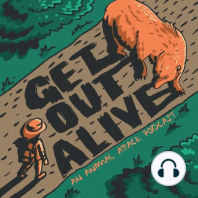51 min listen

Ep. 76: India's Big 3 (Feat. Mathen "Rajeev" Mathew)
Ep. 76: India's Big 3 (Feat. Mathen "Rajeev" Mathew)
ratings:
Length:
63 minutes
Released:
Apr 17, 2024
Format:
Podcast episode
Description
I had the pleasure of speaking with wildlife researcher and human-wildlife conflict specialist, Mathen "Rajeev" Mathews, about the animals he studies that cause some of the most dramatic conflicts in India: Tigers, leopards and elephants. I was stunned by how many attacks occur by each of these animals a year, and we dive into why these attacks and deaths happen. Just be warned, it does get graphic.If you'd like to learn more about the illegal wildlife trade, check out the documentary I mentioned up top, Sea of Shadows.Support the showSupport the show for free by leaving a 5-star review wherever you're listening, or on GoodPods or Podchaser (where we can respond to your comments).Follow us on Instagram, Facebook, Tiktok, check out our website GetOutAlivePodcast.com and join us on Patreon (where you can now follow us for free)!Support the show by shopping at www.getoutalivepodcast.com/shopYou can find Ashley @TheAngryOlogist on Twitter
Released:
Apr 17, 2024
Format:
Podcast episode
Titles in the series (79)
Ep. 1: The Champawat Tigress (feat. Sam Helle) by Get Out Alive: An Animal Attack Podcast